Through the engagement with the practices of commissioning, purchasing and displaying the work of artists, the University has amassed a collection of around 8,000 artworks spanning a period of almost two millennia.
The early stages of this collecting were closely linked with galvanising the institution’s identity and status through the commissioning and collecting of portraits and busts of Professors and alumni. Over time, the University began to look to artworks as a means of decoration for the buildings and campuses constructed as advancements happened in fields of study.
Today, the University of Edinburgh and CAHSS has a reputation for world-class research and high quality teaching; it is a place for experimentation, innovation and risk taking, with activities that challenge assumptions, inspire and make impact locally and globally. The Art Collection’s vision and ambition for art at the University is no different.
Alongside displaying the collection across campus and lending to external venues, greater emphasis is now placed on the acquisition and use of artworks in the support and development of research and teaching. Commissioning art plays a significant part in this objective and offers up a real opportunity for internal and external collaboration at the University.
Commissioning is a practice that involves the engaging of an artist in the production of a new work of art. Historically this included paying artists to create statues, religious iconography or portraits of family members, but in the present day it covers an ever-expanding range of materials, processes and possibilities. During the Covid-19 pandemic, the Art Collection’s commissioning has continued and included a series of commissions directly influenced by the tumultuous context.
The Lockdown Commissions
In recognition of the challenges for artists produced by the pandemic, and with a desire to support individuals and respond rapidly to this major historical event, the Art Collection funded a series of three ‘lockdown’ commissions at the beginning of the 2020 lockdown in the UK.
Designed specifically to enable the production of new work during the period of enforced social distancing and limited movement, the commissions offered focused but flexible support, with artists invited to critically and personally reflect on the period of social upheaval and change. The following three artists/groups were directly approached by the collection, and awarded £5,000.00 towards the production and acquisition of a new work.
Daisy Lafarge b.1992
Five Tongues, 2020
Text workFive Tongues is a text created by Lafarge in response to her experience researching and engaging with her immediate surrounds during lockdown, and particularly green alkanet (or Pentaglottis Sempervirens), a plant growing in her garden.
The plant’s five tongues come from Greek (penta + glottis) and accordingly Lafarge divides the text into five parts or ‘tongues’ each exploring a different aspect of her journey of discovery. The text thoughtfully traverses botanical history, etymology, and the plants hosting of aphids and micro-organisms, to consider ideas of reciprocity, love, hearsay, and classification.
The Art collection acquired the rights to the text, which was immediately embedded into undergraduate teaching in 2020/1. In addition Lafarge designed a limited print run, which was sold by the artist to raise funds for two charities. The text has also been featured in Daunt Book’s 2021 anthology In the Garden.
This is the second work by Lafarge to enter the collection, after the moving image work, Not for Gain, was acquired from her 2016 ECA Degree show. Similarly to Five Tongues, Lafarge‘s approach to the research for Not for Gain was ‘motivated by an attempt to foreground ecology as both subject and methodology.’
If you wish to read Five Tongues, please contact the art collection to get a digital copy of the text.
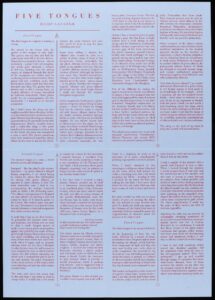
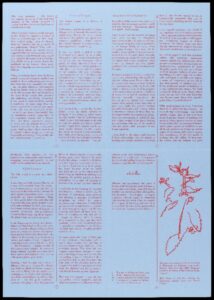
Manual Labours (aka Jenny Richards and Sophie Hope)
The Global Staffroom 2020
Recordings of a live broadcast podcast series (14 episodes)
Manual Labours Manual #5 2021
A manual of research questions and projects
Manual Labours is a research project exploring physical and emotional relationships to work, initiated by Jenny Richards and Sophie Hope. The project reconsiders current time-based structures of work (when does work start and end?) and reasserts the significance of the physical (manual) aspect of immaterial, affective and emotional labour.
During Lockdown Manual Labours were developing and delivering The Global Staffroom, a live weekly podcast series of conversations and interviews with people about what it feels like to care, be cared for, not be able to care at work. Episodes covered topics directly relevant to the pandemic including architecture of home-work, racialised experiences of lockdown, emotional labour of care and health workers, social reproduction and remote working.
The Art Collection commission supported the production of The Global Staffroom, including the redesign of the Manual Labours podcast webpage. In addition, the funding has gone towards the compilation of Manual #5 – a compendium of the research and questions developed from the podcast series – which will be available for use in teaching in 2021/2.
ProjectWakaka (aka Jennie Temple, Chris Walker, Rudy Walker and Alice Walker)
All the Birds, 2020
Mixed media
all-the-birds is a body of work made by !!Project!WAKAKA, a family of four based in Edinburgh. The family have been making work together on and off since 2010, but have renewed activity in light of lockdown and the Art Collection commission. This intense making and family isolation has resulted in homemade screen-prints, video work, drawings and writings as well as a vast amount of documentation of their conversations, one-off statements and reflections – both individually and as a family- over a four or five month period.
The title of the work comes from a project started in the beginnings of lockdown, which stemmed from a Daily Mail poster of common garden birds given to the family. Each member of the household picked a bird from the poster, drew and learned something about it and then printed it on the kitchen table using a homemade industrial drying process. This culminated in a final larger print of each printed bird collaged together.
The family has developed a website to organise the work that they are making, to keep track of developments, log thoughts and play. The final outcome is still in progress but, a selection of the material and surrounding documentation, likely to be combined into a publication, will join the Art Collection for use in teaching and research in 2021/2.
To discuss using these lockdown commissions– or any other artworks in the Collection- in teaching and research please get in touch with the collection curatorial team: is-crc@ed.ac.uk.
The University Art Collection is managed by the curatorial team consisting of the Art Collections Curator, Julie-Ann Delaney, and Assistant Curator, Liv Laumenech.
Other Information
The Art Collection is one of many University heritage collections managed by the Centre for Research Collections; a research lab for the humanities located in the University Main Library. Read about and search the Art Collection online here: https://collections.ed.ac.uk/artIf you are a student or staff member at the University, you can view the moving image artworks held in the Art Collection on Mediahopper. https://media.ed.ac.uk/channel/Moving%2BImage%2BWorks/96102512
Find out more about the Degree Show Purchase Prize on our Google Arts & Culture Story https://artsandculture.google.com/story/mQVR1auYykVafQ
Looking to Commission?
The Art Collection can offer support and advice to those wishing to commission permanent and temporary art for university buildings, as an integrated part of research or affiliated activity.
In 2019 the University Commissioning Guidelines were updated and rewritten by the Art Collection. To request a copy of the guidelines or speak about commissioning please get in touch with the curatorial team: is-crc@ed.ac.uk
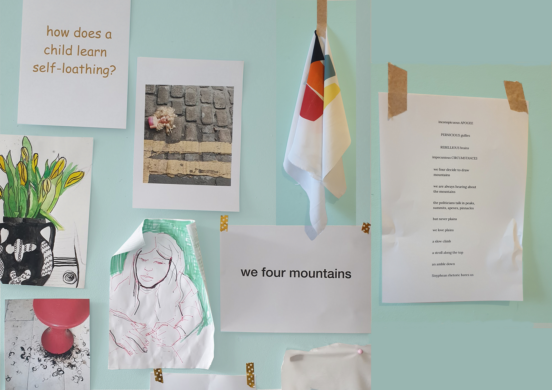
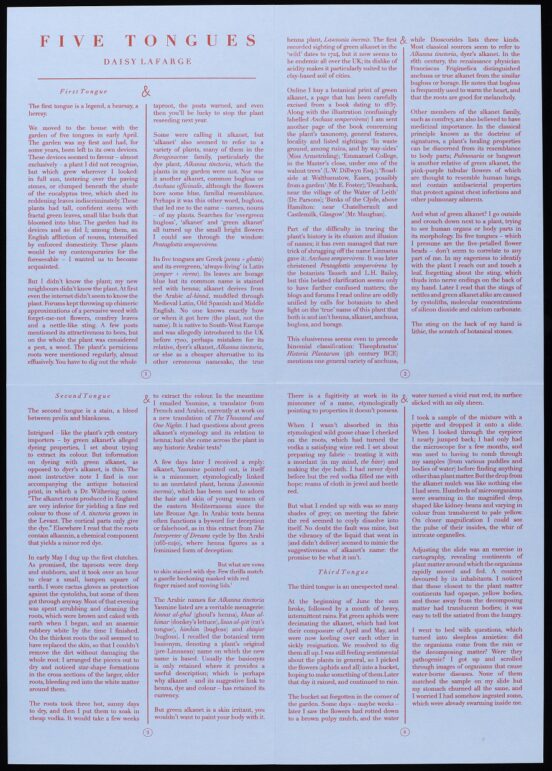
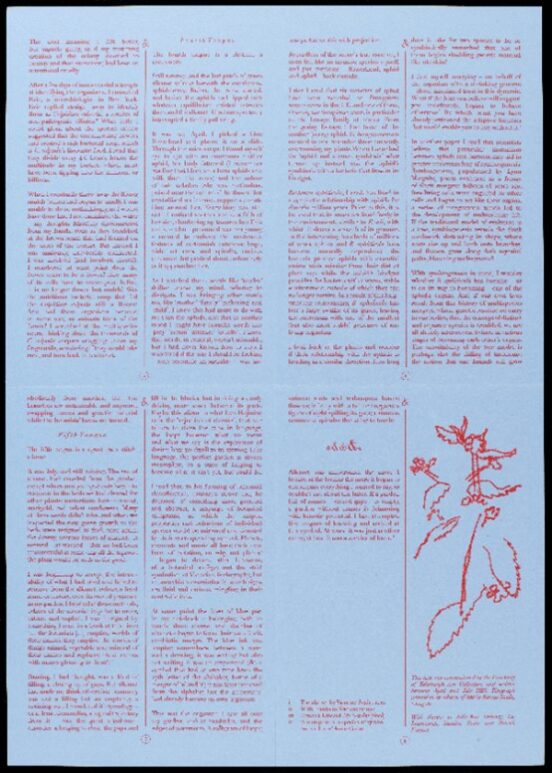

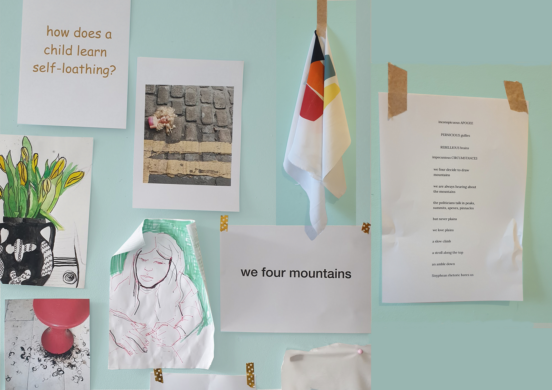




Comments by Hashemi